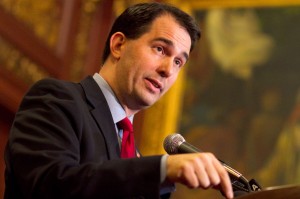 Ross Douthat has a striking observation on the futile Wisconsin recall: rather than echo the conventional Republican theme that the effort was an ill-conceived liberal putsch, aimed at overturning the fruits of both the electoral and legislative process, he compares the saga to 2009-10, when Barack Obama’s Democrats rammed through sweeping domestic legislation and the Right decisively counterattacked in the midterms. Provocatively, he calls them “mirror image exercises in reverse shock and awe, and…backlash.”
Ross Douthat has a striking observation on the futile Wisconsin recall: rather than echo the conventional Republican theme that the effort was an ill-conceived liberal putsch, aimed at overturning the fruits of both the electoral and legislative process, he compares the saga to 2009-10, when Barack Obama’s Democrats rammed through sweeping domestic legislation and the Right decisively counterattacked in the midterms. Provocatively, he calls them “mirror image exercises in reverse shock and awe, and…backlash.”
Fascinating stuff. Of course, it’s a message some conservatives will blanche at for the simple reason that a recall is an extremely unprecedented gesture—three governors in our history have fallen victim—while the 2010 off year races were obviously a regularly scheduled democratic exercise. But Douthat surely has the ultimate conclusion right: both sides have gotten well schooled in the gymnastics of cut and slash opposition; it’s just that Republicans are getting the better of it. And as Douthat allows, the outcome in a bluish state that Democrats are still favored to carry underscores the political pull of reeling in outsized spending and the relative weakness of the liberal alternative, when both are put to the test.
I would even go one major step further: in the post LBJ era, the public has arguably never validated a specific, identifiable liberal agenda at the ballot box. The winning Democrats in that time frame—Carter, Clinton and Obama—have won on a tightly crafted appeal that stressed economic anxiety and blurred ideological content. Even the one congressional landslide for Democrats in memory, the 2006 midterms, were linked primarily to fatigue with Iraq and Republican overreach on Social Security. If one reads the post Reagan era as a closely matched siege over time, the left owes its victories to negative referenda on incumbents and a couple of superstar performers. In other words, liberals have been cursed to plot a course identical to the one they dismissively suggested accounted for Ronald Reagan.
But there is a particularity to the debate in Wisconsin that invites caution. More than any soaring theory of conservatism, the firefight up north turned on a Democratic conceit about public sector unions—one assuming public outrage over state employees footing a larger bill for their benefits, even a minimal one compared to private sector contributions. The outrage simply didn’t show up in Wisconsin, at least outside the Democratic base. That‘s a comparatively cheap victory for Republicans, though, in one sense: an electorate that rejects a gilded set of privileges for public sector employees is not inevitably one that would realign, say, Medicare. Perhaps it would if convinced that the venerable entitlement is itself an unsustainable return of benefits that vastly exceed contributions, and that part of what makes it unsustainable is a funding formula that underestimates the affluence of seniors. But the same public might just as easily balk if the reform is categorized as instability and uncertainty taking the place of predictability, which Democrats allege; or worse, a tradeoff forced by Washington elites who are shielded from the sacrifice they are exacting on others.
So, I would count Wisconsin as a mixed blessing. The result confirms the liberal weakness conservatives have been describing, and underscores a very specific liberal fallacy about the public employee sector, without confirming that post 2008 is one rolling, rightward tide set to come ashore this November. The hard fact is that Republicans are nowhere making a national case as specific or definitive as the one Scott Walker’s term has made in Wisconsin—the GOP message is still disproportionately, if understandably, a counter-reaction to Obama, and polling suggests swing voters are largely unacquainted with its content beyond keeping taxes in check. Nor is the Republican blueprint that is on the books (a hard choices deficit reduction program by the other Wisconsin maverick, Paul Ryan) one with the resonance or populist appeal of Walker’s pension overhaul: selling that blueprint would be a supreme test for a President Romney, but it almost certainly won’t be the preoccupation of candidate Romney. To the extent that Republicans miss these distinctions, there is a risk that Wisconsin will be mis-read as a validation of a still untested argument.










Leave a Reply